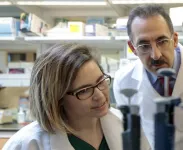Computer scientists: We wouldn't be able to control super intelligent machines
New findings from theoretical computer science
2021-01-11
(Press-News.org) We are fascinated by machines that can control cars, compose symphonies, or defeat people at chess, Go, or Jeopardy! While more progress is being made all the time in Artificial Intelligence (AI), some scientists and philosophers warn of the dangers of an uncontrollable superintelligent AI. Using theoretical calculations, an international team of researchers, including scientists from the Center for Humans and Machines at the Max Planck Institute for Human Development, shows that it would not be possible to control a superintelligent AI. The study was published in the Journal of Artificial Intelligence Research.
Suppose someone were to program an AI system with intelligence superior to that of humans, so it could learn independently. Connected to the Internet, the AI may have access to all the data of humanity. It could replace all existing programs and take control all machines online worldwide. Would this produce a utopia or a dystopia? Would the AI cure cancer, bring about world peace, and prevent a climate disaster? Or would it destroy humanity and take over the Earth?
Computer scientists and philosophers have asked themselves whether we would even be able to control a superintelligent AI at all, to ensure it would not pose a threat to humanity. An international team of computer scientists used theoretical calculations to show that it would be fundamentally impossible to control a super-intelligent AI.
"A super-intelligent machine that controls the world sounds like science fiction. But there are already machines that perform certain important tasks independently without programmers fully understanding how they learned it. The question therefore arises whether this could at some point become uncontrollable and dangerous for humanity", says study co-author Manuel Cebrian, Leader of the Digital Mobilization Group at the Center for Humans and Machines, Max Planck Institute for Human Development.
Scientists have explored two different ideas for how a superintelligent AI could be controlled. On one hand, the capabilities of superintelligent AI could be specifically limited, for example, by walling it off from the Internet and all other technical devices so it could have no contact with the outside world -- yet this would render the superintelligent AI significantly less powerful, less able to answer humanities quests. Lacking that option, the AI could be motivated from the outset to pursue only goals that are in the best interests of humanity, for example by programming ethical principles into it. However, the researchers also show that these and other contemporary and historical ideas for controlling super-intelligent AI have their limits.
In their study, the team conceived a theoretical containment algorithm that ensures a superintelligent AI cannot harm people under any circumstances, by simulating the behavior of the AI first and halting it if considered harmful. But careful analysis shows that in our current paradigm of computing, such algorithm cannot be built.
"If you break the problem down to basic rules from theoretical computer science, it turns out that an algorithm that would command an AI not to destroy the world could inadvertently halt its own operations. If this happened, you would not know whether the containment algorithm is still analyzing the threat, or whether it has stopped to contain the harmful AI. In effect, this makes the containment algorithm unusable", says Iyad Rahwan, Director of the Center for Humans and Machines.
Based on these calculations the containment problem is incomputable, i.e. no single algorithm can find a solution for determining whether an AI would produce harm to the world. Furthermore, the researchers demonstrate that we may not even know when superintelligent machines have arrived, because deciding whether a machine exhibits intelligence superior to humans is in the same realm as the containment problem.
INFORMATION:
The study "Superintelligence cannot be contained: Lessons from Computability Theory" was published in the Journal of Artificial Intelligence Research. Other researchers on the study include Andres Abeliuk from the University of Southern California, Manuel Alfonseca from the Autonomous University of Madrid, Antonio Fernandez Anta from the IMDEA Networks Institute and Lorenzo Coviello.
ELSE PRESS RELEASES FROM THIS DATE:
2021-01-11
When an accident occurs, the reactions of bystanders are important. Researchers have studied whether laypeople realise the severity of the situation when someone in their proximity begins to bleed, and whether they can estimate how much the person is bleeding. The results show a discrepancy related to the victim's gender: for a woman losing blood, both blood loss and life-threatening injuries were underestimated. The study has been published in the scientific journal PLoS One.
Researchers from Linköping University and Old Dominion University in the United States wanted to study the ability of laypeople to visually assess blood loss, and what influences them when judging the severity of an injury.
"Laypeople's ...
2021-01-11
Recent years have provided substantial research displaying the effect of genetic mu-tations on the development of autism and other neurodevelopmental disorders. Based on those studies, researchers have focused attention on the commonalities be-hind those mutations and how they impact on the functioning of the brain. A study conducted by Professor Sagiv Shifman from the Life Sciences Institute at the He-brew University of Jerusalem and the Center for Autism Research has found that genes associated with autism tend to be involved in the regulation of other genes and to operate preferentially in three areas of the brain; the cortex, the striatum, and the cerebellum.
The cerebellum ...
2021-01-11
Rice is the staple food of about half the world's population. The cultivation of the rice plant is very water-intensive and, according to the German aid organization Welthungerhilfe, around 15 per cent of rice is grown in areas with a high risk of drought. Global warming is therefore becoming increasingly problematic for rice cultivation, leading more and more often to small harvests and hunger crises. Crop failures caused by plant pathogens further aggravate the situation. Here, conventional agriculture is trying to counteract this with pesticides, which are mostly used as a precautionary measure in rice cultivation. The breeding of resistant plants is the only alternative to these environmentally harmful ...
2021-01-11
Seeking to understand why COVID-19 is able to suppress the body's immune response, new research from the USC Leonard Davis School of Gerontology suggests that mitochondria are one of the first lines of defense against COVID-19 and identifies key differences in how SARS-CoV-2, the virus that causes COVID-19, interacts with mitochondrial genes when compared to other viruses.
These differences offer possible explanations as to why older adults and people with metabolic dysfunction have more severe responses to COVID-19 than other individuals, and they also provide a starting point for more targeted experiments that may help identify therapeutics, said senior author Pinchas Cohen, professor of gerontology, ...
2021-01-11
Our bodies often dispatch stem cells to mend or replace biological damage, but how these repair agents make their way through dense tissue to arrive at the scene had been a mystery. "How stem cells squeeze through tissue openings a hundred to a thousand times smaller than themselves had been a perplexing question," says Ovijit Chaudhuri, professor of mechanical engineering.
In an article published in the Jan. 8 edition of Science Advances, Chaudhuri and colleagues reveal that stem cells use their nucleus - a large, stiff organelle within the cell - as a means of propulsion.
Their discovery was surprising because scientists had thought cells would have particular ...
2021-01-11
(St. Louis) - A new study by investigators at the Shriners Hospital for Children -- St. Louis suggests the damaging effects of obesity are not due to body weight but rather come from something much smaller - biochemical signals released by fat cells.
The study focuses on the link between overweight or obesity and the development of osteoarthritis, a painful disease of the joints. The investigation was led by Dr. Farshid Guilak, director of the St. Louis Shriners Hospital Research Center.
"We've shown here that it's not overloading of the joints that is responsible for osteoarthritis, but, more likely, a factor given off by fat cells that makes cartilage susceptible to degeneration," ...
2021-01-11
ATLANTA AND TAMPA, FLA. - JANUARY 11, 2021 - A new study suggests a link between toxoplasma gondii (T. gondii) infection and the risk of glioma, a type of brain cancer, in adults. The report, appearing in the International Journal of Cancer, finds that people who have glioma are more likely to have antibodies to T. gondii (indicating that they have had a previous infection) than a similar group that was cancer free.
For the study, investigators led by James Hodge, JD, MPH and Anna Coghill, PhD examined the association between T. gondii antibodies measured several years before the cancer ...
2021-01-11
Scientists at Dana-Farber Cancer Institute and the Centers for Disease Control and Prevention have uncovered new evidence of the potential health risks of chemicals in tobacco and marijuana smoke.
In a study published online today by END ...
2021-01-11
Around 1085 AD, along the southern rim of Northern Arizona's elevated Colorado Plateau, a volcano erupted, forever changing ancient Puebloan fortunes and all nearby life. Among the 600 or so volcanoes that dot the landscape of the San Francisco volcanic fields, this one blew. It was the very first (and last) eruption for what came to be known as Sunset Crater, aptly named for its multi-hued, 1,000-foot-tall cinder cone.
Today, ASU School of Earth and Space Exploration scientist Amanda Clarke and her team have been working to solve the mysterious root cause of the Sunset Crater eruption and any lessons learned to better understand the threats similar ...
2021-01-11
Fieldwork led by Dr Eleanor Scerri, head of the Pan-African Evolution Research Group at the Max Planck Institute for the Science of Human History in Germany and Dr Khady Niang of the University of Cheikh Anta Diop in Senegal, has documented the youngest known occurrence of the Middle Stone Age. This repertoire of stone flaking methods and the resulting tools includes distinctive ways of producing sharp flakes by carefully preparing nodules of rock, some of which were sometimes further shaped into tool forms known as 'scrapers' and 'points.' Middle Stone Age finds most commonly occur in the African record between around 300 thousand and 30 thousand years ago, after which point ...
LAST 30 PRESS RELEASES:
[Press-News.org] Computer scientists: We wouldn't be able to control super intelligent machines
New findings from theoretical computer science







